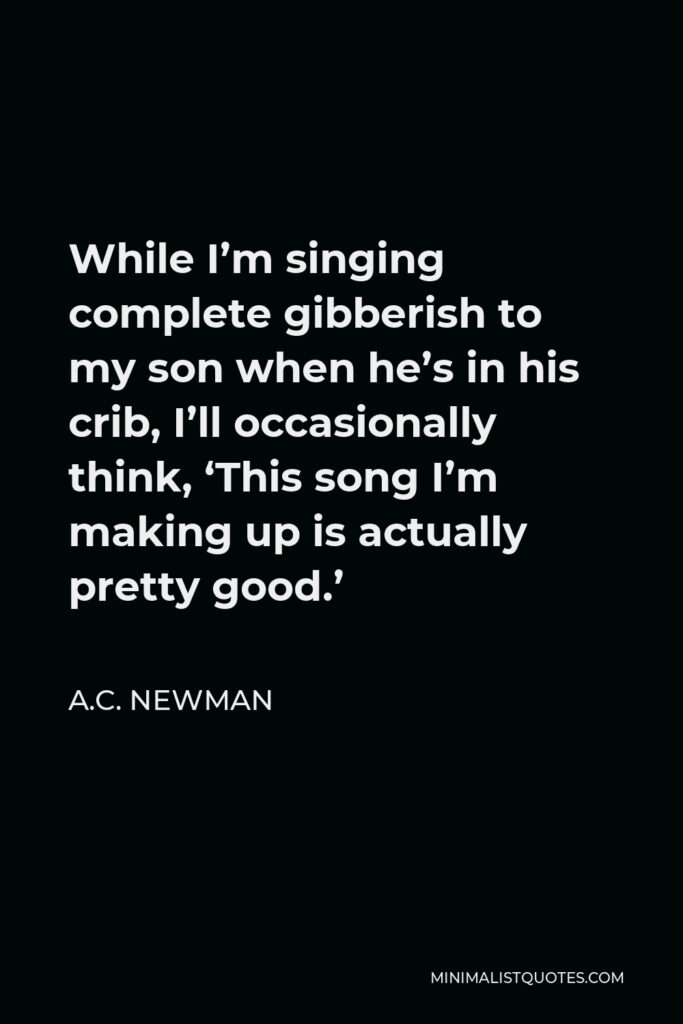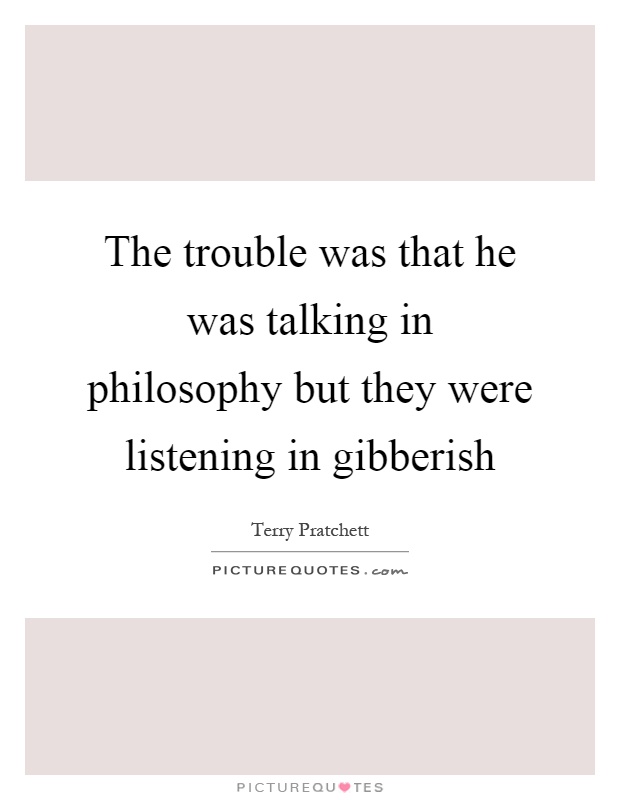Gibberish Quotes: Exploring The Beauty Of Nonsensical Wisdom
Have you ever stumbled upon gibberish quotes and wondered if they hold any meaning? These seemingly random phrases often spark curiosity and invite interpretation. While gibberish may appear senseless at first glance, it carries a unique charm that resonates with many people. From abstract poetry to cryptic sayings, gibberish quotes have carved out their own niche in the world of literature and self-expression.
In today's fast-paced world, gibberish quotes offer an escape from conventional thinking. They encourage creativity, open-mindedness, and the freedom to explore unconventional ideas. Whether used for humor, inspiration, or artistic expression, these quirky phrases have a way of captivating our imagination.
This article dives deep into the world of gibberish quotes, exploring their origins, meanings, and cultural significance. We'll also examine how these seemingly nonsensical phrases can inspire creativity, spark conversations, and even provide life lessons. Let's embark on this journey together!
Read also:June Tenth Zodiac Discover The Mystical Traits And Secrets Of Gemini And Cancer Cusp
Table of Contents
- What Are Gibberish Quotes?
- The History of Gibberish
- Famous Gibberish Quotes
- Types of Gibberish Quotes
- How to Create Your Own Gibberish Quotes
- The Psychological Impact of Gibberish
- Cultural Significance of Gibberish
- Gibberish in Literature and Poetry
- Gibberish in Pop Culture
- Conclusion
What Are Gibberish Quotes?
Gibberish quotes are phrases or sentences that appear to lack coherent meaning but often carry symbolic or metaphorical significance. These quotes challenge conventional language structures and invite readers to think outside the box. While they may seem absurd on the surface, gibberish quotes often resonate with people on a deeper level, sparking creativity and introspection.
For instance, consider the famous quote, "The flibber jabber wobbles in the moonlight." While it doesn't follow standard grammar rules, it evokes vivid imagery and encourages imaginative interpretation. This playful approach to language has captivated audiences across cultures and generations.
The History of Gibberish
Origins of Gibberish
The use of gibberish dates back centuries, with roots in various cultural traditions. In medieval Europe, gibberish was often used in jest during festivals and carnivals. Similarly, Native American tribes employed nonsensical language in rituals to invoke spiritual connections. Over time, gibberish evolved into a form of artistic expression, gaining popularity in literature, theater, and music.
Some notable historical figures, such as Lewis Carroll and James Joyce, embraced gibberish in their works. Their creative use of language paved the way for modern interpretations of nonsensical phrases.
Famous Gibberish Quotes
Classic Examples
Throughout history, several gibberish quotes have become iconic. Here are a few examples:
- "Twas brillig, and the slithy toves" – Lewis Carroll, Alice's Adventures in Wonderland
- "Quark glark blibber snark" – Douglas Adams, The Hitchhiker's Guide to the Galaxy
- "Flibber doodle wobble snoodle" – Dr. Seuss, The Cat in the Hat
These quotes not only entertain but also challenge readers to think beyond conventional language barriers.
Read also:Barack Obama And P Diddy Exploring Their Influence Leadership And Cultural Impact
Types of Gibberish Quotes
Categories and Classifications
Gibberish quotes can be categorized into several types based on their purpose and style:
- Abstract Gibberish: Phrases that focus on evoking emotions or imagery rather than conveying literal meaning.
- Humorous Gibberish: Quotes designed to entertain and amuse through absurdity.
- Philosophical Gibberish: Nonsensical phrases that encourage deep thought and introspection.
- Artistic Gibberish: Quotes used in creative works such as poetry, music, and visual art.
Each type serves a unique purpose, appealing to different audiences and contexts.
How to Create Your Own Gibberish Quotes
Tips and Techniques
Creating your own gibberish quotes can be a fun and rewarding experience. Here are some tips to get you started:
- Experiment with word combinations that defy conventional grammar rules.
- Incorporate playful sounds and rhymes to enhance the whimsical nature of your quotes.
- Draw inspiration from nature, dreams, or everyday observations.
- Encourage readers to interpret your quotes in their own unique ways.
By embracing creativity and experimentation, you can craft gibberish quotes that captivate and inspire.
The Psychological Impact of Gibberish
Effects on the Mind
Gibberish quotes can have a profound impact on the human psyche. Studies suggest that engaging with nonsensical language stimulates creative thinking and problem-solving skills. By challenging conventional thought patterns, gibberish encourages individuals to approach situations from new perspectives.
Moreover, gibberish can serve as a form of stress relief, providing an outlet for self-expression and emotional release. Its playful nature often evokes laughter and joy, contributing to overall well-being.
Cultural Significance of Gibberish
Global Perspectives
Gibberish holds cultural significance across the globe, reflecting diverse traditions and values. In some cultures, gibberish is seen as a form of rebellion against oppressive language norms. In others, it serves as a tool for humor and social commentary.
For example, in Japan, nonsensical phrases known as "kyara-ben" are used to create playful expressions in everyday conversations. Similarly, African tribes utilize gibberish in storytelling to convey moral lessons and cultural heritage.
Gibberish in Literature and Poetry
Artistic Expression
Literature and poetry have long embraced gibberish as a form of artistic expression. Authors and poets use nonsensical language to create vivid imagery, evoke emotions, and challenge readers' perceptions. By breaking free from traditional language constraints, they unlock new dimensions of creativity.
Modern poets continue to experiment with gibberish, incorporating it into their works to explore themes of identity, reality, and human experience. This innovative approach to language has inspired countless readers and writers alike.
Gibberish in Pop Culture
Modern Influence
Gibberish has made its mark on pop culture, appearing in movies, TV shows, and music. Iconic characters such as The Joker in "Batman" and Bart Simpson in "The Simpsons" frequently employ nonsensical phrases to humorous effect. Similarly, musicians like Björk and Prince have incorporated gibberish into their lyrics, adding layers of complexity and intrigue to their art.
As pop culture continues to evolve, gibberish remains a beloved element, capturing the imagination of audiences worldwide.
Conclusion
In conclusion, gibberish quotes offer a unique window into the world of creative expression and unconventional thinking. From their historical roots to their modern-day applications, these seemingly nonsensical phrases have proven to be powerful tools for inspiration, entertainment, and cultural exploration.
We encourage you to embrace gibberish in your own life, whether through writing, art, or everyday conversations. Share your favorite gibberish quotes in the comments below, and don't forget to explore our other articles for more fascinating insights into the world of language and creativity.
Data Source: Encyclopedia Britannica, Poetry Foundation

